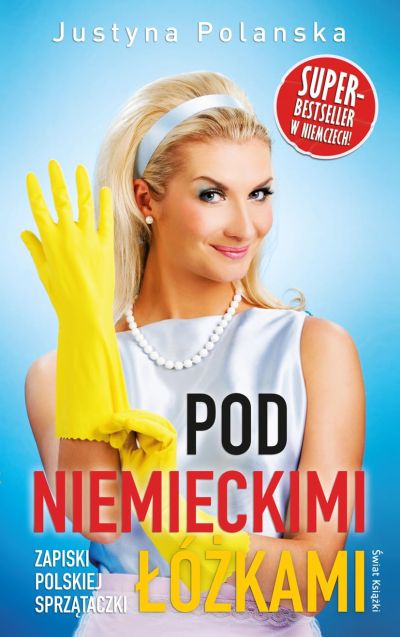“We still have a lot to sort out”. An interview with Holger Schlageter, author of “Unter deutschen Betten. Eine polnische Putzfrau packt aus” (“Beneath German beds. A Polish cleaning lady reveals all”)

Porta Polonica: Mr Schlageter, in 2011, you already had a number of books published, including advice manuals such as “Das Geheimnis gelassener Erziehung” (“The Secret to Stress-Free Parenting”) and “Führen mit Zielen” (“Goal-Oriented Leadership”). With your doctorate in theology and degree in psychology, what made you take a sudden interest in Polish cleaning ladies?
Holger Schlageter: The subject was literally served to me on a platter. At that time, several of my friends had taken on cleaning ladies from Poland, and I had chatted with one of them once in a while. I quickly discovered that they had stories to tell. Stories that should be of interest to many more people.
PP: What do you mean by that exactly?
HS: Well, imagine that you arrive in a country, without much knowledge of the language and the culture, a country that you only know about from hearsay, and you work there in private households without any binding contractual rules. There’s quite a lot of interesting material in there.
PP: Can you give me an example?
HS: Well, there’s no doubt that as a group, cleaning ladies have a strong work ethic and are willing to take risks. They’re also curious by nature, they’re open-minded and want to take control of their own lives. However, during that time, from a German perspective they were far down on the social ladder. Cleaning is considered to be a low-grade job, and the legal framework around employment was often unclear. Not only that, the language barrier and different mentalities can also lead to conflict. Also, against this background, some Germans have not exactly shown themselves at their best. The cleaning ladies whom I spoke to told me how they had suffered prejudice and arrogant treatment, as well as unacceptable behaviour and excessive familiarity. But of course, the opposite was also true: their employers could be wonderfully supportive and kind. After all, there are human beings involved on both sides.
PP: But what specifically motivated you so strongly to write a whole book about the subject?
HS: On the one hand, I was interested in the subject of “social justice”. On the other, as a psychologist, I realised that the material was simply very strong. There’s the cleaning lady, allegedly of low status, holding a mirror up to German citizens. It was an interesting perspective, and one that hadn’t been written about much at the time.
PP: How did you compile the material for the book?
HS: I conducted a lot of interviews, gathered people’s stories, and did research. Among the cleaning ladies, I had one main source who also gathered stories from her colleagues and passed them on to me. I decided to write under a pseudonym to bring the whole thing alive and make it more direct. I also wrote in a simple, humorous style in order to reach as many readers as possible. I wasn’t interested in writing a sermon; I wanted to lend a voice to a fictitious, typical cleaning lady.
PP: What features did you take into account when you created “Justyna Polanska”?
HS: I based her on the cleaning lady who was my main source. She’s a smart, dynamic, tough person, who is a keen observer and doesn’t get easily offended. But of course, she’s a fictitious character. The language already gives it away: this isn’t the kind of German that the Polish cleaning ladies spoke.
PP: Could you perhaps be accused, at least today, of cultural appropriation? You used a topic to write a book that isn’t your own and made money from it.
HS: Of course, it’s obvious that I’ve made myself open to criticism. I shared half of all the profits from the book with the woman who inspired “Justyna”. Like so many other cleaning ladies, she wouldn’t have been able to write the book herself, and in all probability, she would never have had the idea to do so. And I wouldn’t have been able to write it without cleaning ladies like her. I see it as a win-win situation and not as yet more exploitation.
PP: How did the Polish cleaning ladies react to the book?
HS: Their response was very, very positive. Many of them were simply super happy to read it and to show it to their relatives, friends and acquaintances. A lot of them told me that it made them proud and that they were grateful. That was great to hear.
PP: Was the overall reaction just as positive?
HS: Actually, it was. The book was published just at the right time and it hit a nerve. I was given a lot of encouragement from people in Germany and Poland, and got some really good feedback. Even on social media, at least 80 percent of people’s comments were positive. The other 20 percent were along the lines of “These stupid cleaners shouldn’t make such a fuss. If they don’t like it, they should clear off back to Poland.” Unfortunately, sentiments like these were only to be expected. They reflect the kind of narrow-mindedness that is also described in the book.
PP: How much of the material in the book did you make up yourself?
HS: Perhaps 30 percent. Often, though, these aren’t things that I’ve completely come up with in my head; rather, it’s material that I was given that I edited to make it a better read. The prologue is purely a product of my imagination, though. It’s a strong kick-start to the book.
PP: The book was a major success. A follow-up was published a year later.
HS: Yes, “Nicht ganz sauber. Eine polnische Putzfrau räumt auf.” (“Not squeaky clean. The honest story of a Polish cleaning lady.”) And in 2017, the film version of “Unter deutschen Betten” came out in the cinemas. “Justyna” was played by Magdalena Boczarska, alongside Veronica Ferres and Heiner Lauterbach in the other main roles. I had the opportunity to work as an advisor during the filming, which was a new and exciting experience. And in retrospect, I’m glad that the book topped the bestseller list in Poland as well as in Germany. It also sold well in other European countries. I’m grateful to have had this experience.
PP: Did the books generate debate about the issue of foreign workers in the low-wage sector?
HS: Yes, they did. “Justyna” in particular was an important driver in the debate surrounding the minimum wage at the time.And in Poland, people began talking about the Ukrainian cleaning ladies who worked under very similar conditions there. Incidentally, my main source of material appeared as “Justyna” on talk shows in Germany and particularly in Poland, wearing a wig and sunglasses, and helped attract more attention to the issue.
PP: What do you think about the way in which Polish cleaning ladies are treated in Germany today?
HS: First of all, the situation in Poland has improved. Now that it is in the EU, Poland offers far better opportunities and people there are much more aware of their self-worth. Nowadays, cleaning ladies working in Germany often come from other countries. Unfortunately, far too many of them are not covered by the official employment regulations; the majority still work on the black market. And that means that in practice, they have no legal protection. There are people working in other areas, too, who are far too often overlooked, such as delivery couriers or all the care work provided by people from other countries. Unfortunately, we need to keep reminding ourselves that there’s quite a lot that needs to be improved. I’m an optimist, and prefer to focus on what is possible rather than on the obstacles to progress. Even so, I also think that we still have a lot to sort out.
PP: Are you already working on a new book?
HS: To be honest, after ten books in ten years, I don’t feel that I have much more to say. Most of all, as CEO of my Schlageter Institute, I already have more than enough work on my plate. Having said that, if I come across a subject that provokes the same strong response in me as “Justyna”, I’m sure I won’t say no.
Anselm Neft interviewed Holger Schlageter for Porta Polonica in January 2025.







